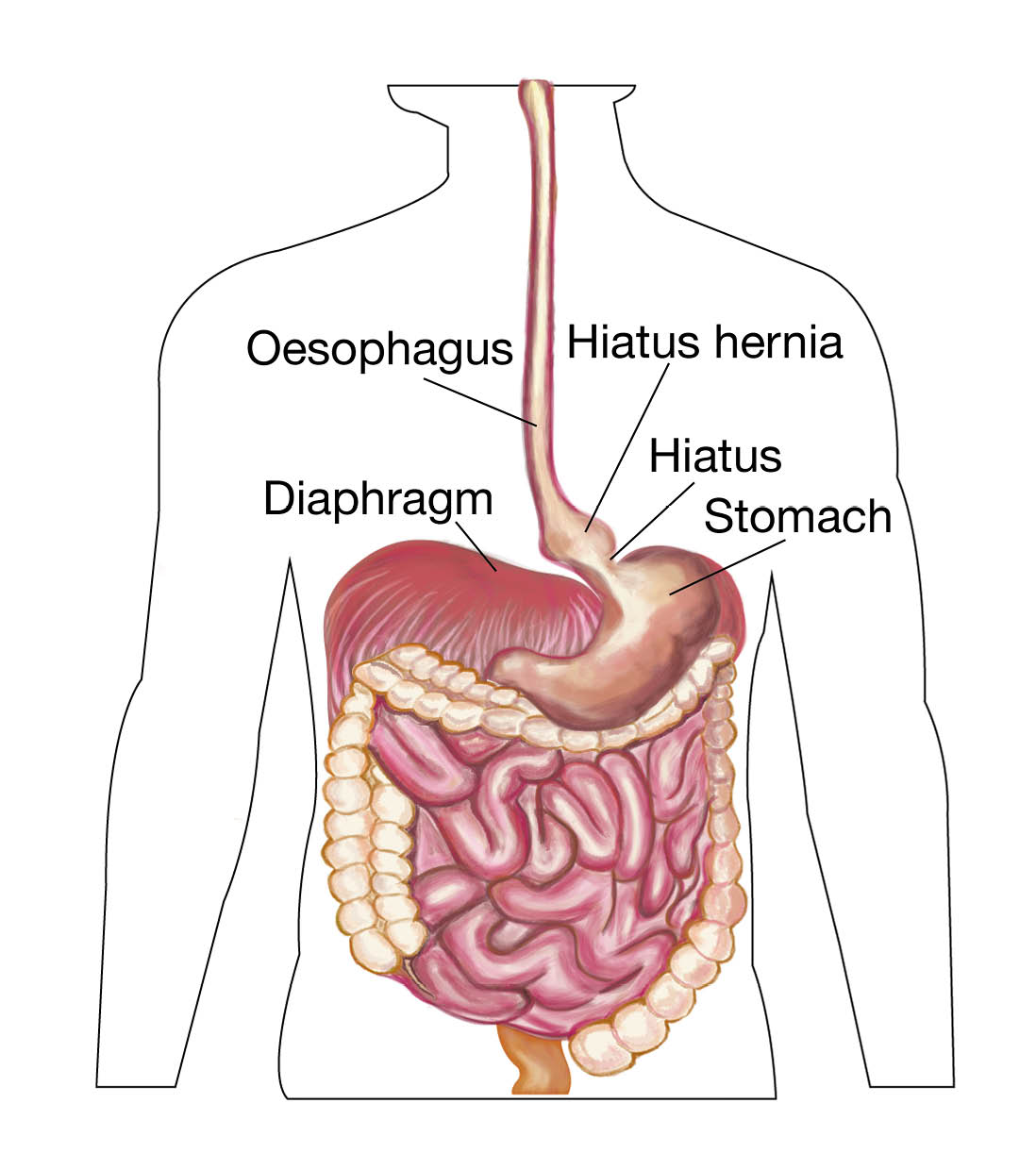Hiatus hernia
Information for patients from the Trust's Endoscopy Units
Your gastroscopy has shown you have a condition called a hiatus hernia. This leaflet explains:
what a hiatus hernia is
what causes the condition, and
what the symptoms and treatments are.
If you have any questions after reading this leaflet, please contact one of the Endoscopy Units.
What is a hiatus hernia?

A hernia is when part of an organ protrudes (pushes) through a muscular wall that holds it in place.
A hiatus hernia is when part of your stomach slides through an opening in your diaphragm, called the hiatus. It moves through the diaphragm and into your chest. The diaphragm is a sheet of muscle that separates your chest from your abdomen (tummy).
What causes hiatus hernia? How common is it?
The exact number of people with a hiatus hernia is not known, as many people with a hiatus hernia do not have symptoms. However, they are thought to be common. Some studies suggest that up to a third of people develop a hiatus hernia sometime in their life, most commonly in middle age. Many hiatus hernias are small.
The cause of hiatus hernia is not clear.
It is thought that most develop in people over the age of 50. It may be that the diaphragm weakens with age and allows part of the stomach to protrude through the diaphragm.
Factors which increase your risk of developing a hiatus hernia include weight lifting, obesity, and pregnancy.
What are the symptoms?
The most common symptoms include acid reflux and heartburn. This may happen if your hiatus hernia stops the valve at the bottom of your oesophagus from closing properly. This can cause acid from your stomach to rise into your oesophagus (gullet).
Other symptoms may include:
pain in your upper abdomen and chest
nausea (feeling sick)
an acid taste in your mouth
bloating
belching, and
a burning pain when you swallow hot drinks.
These symptoms can come and go, and are more likely to be worse after a meal or when you are lying down.
You may also have some uncommon symptoms. If you get any of the following symptoms it can make your diagnosis difficult, as these symptoms can mimic other conditions.
A persistent cough, particularly at night; this is due to the refluxed acid irritating your trachea (windpipe).
Other mouth and throat symptoms. These include gum problems, bad breath, sore throat, hoarseness, and a feeling of a lump in your throat.
Severe chest pain develops in some cases, and may be mistaken for a heart attack.
Many people who have a hiatus hernia have no symptoms at all.
How is a hiatus hernia diagnosed?
If you have symptoms of a hiatus hernia, the most common test to confirm diagnosis is a gastroscopy. This is where a thin, flexible telescope is passed down your oesophagus into your stomach. This allows the doctor or specialist nurse to look inside; a hiatus hernia may be seen.
An alternative is to have a barium swallow. This is a special x-ray test, and is an accurate alternative to confirm a hiatus hernia.
How can my hiatus hernia be treated?
If you have no symptoms, you do not need any treatment.
If you have acid reflux symptoms, treatment will concentrate on any symptoms you may be experiencing linked to your reflux. The following tips may help relieve any symptoms you may experience from your hiatus hernia.
Eat smaller meals.
Do not eat late at night or before you lie down.
Do not eat a large meal just before you go to bed.
When lifting or picking things up, bend from your knees. Bending from your waist may allow acid to travel back into your gullet and cause pain.
Do not smoke. Smoking relaxes the muscle at the base of your gullet and allows acid to flow back into it.
If you are overweight, try losing weight.
Avoid hot, spicy foods.
Cut down how much alcohol you drink.
Avoid tight clothing around your waist, as this increases the pressure on your stomach.
Medications may include antacids and acid-suppressing drugs. This will need to be prescribed by your doctor.
Rarely, a hiatus hernia causes severe symptoms of reflux, which are not eased by medication. If this happens, you may need surgery.
Any further questions?
Please phone the Endoscopy Unit. The units are open Monday to Sunday 8am to 6pm.
Kent and Canterbury Hospital, Canterbury
Telephone: 01227 783058Queen Elizabeth the Queen Mother (QEQM) Hospital, Margate
Telephone: 01843 234370William Harvey Hospital, Ashford
Telephone: 01233 616274
If you have any questions between 6pm and 8am Monday to Sunday then contact the Emergency Department on:
Queen Elizabeth the Queen Mother (QEQM) Hospital, Margate
Telephone: 01843 235030William Harvey Hospital, Ashford
Telephone: 01233 616207
Our units are regularly inspected and audited. Please ask if you want any information about our performance standards. You can also visit the Care Opinion web site.